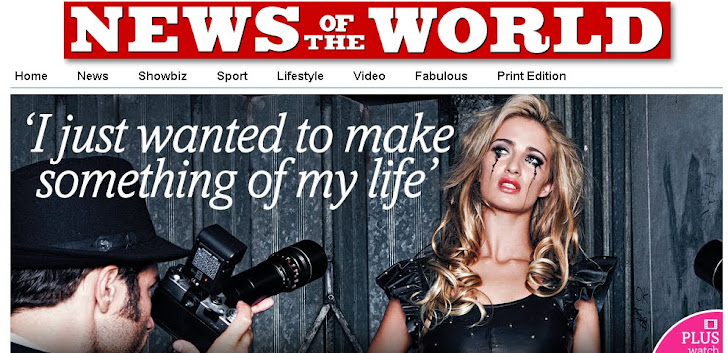• Alastair Campbell alleges that the Daily Mirror paid private eyes to investigate him and Peter Mandelson
• He describes a 'frankly putrid' press with some sections 'barely worth defending'
• The PCC has failed because it is 'of the press and for the press', Campbell claims
• He suggests an arbitration body to replace the PCC that could advise on public interest
This page will update automatically every minute: On | Off
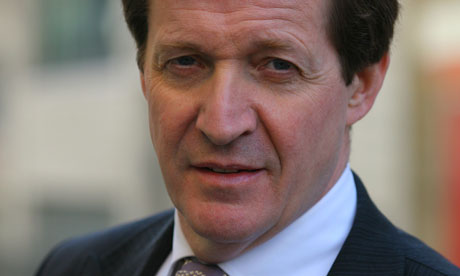
Leveson inquiry: Alastair Campbell is to give evidence. Photograph: Jonathan Player/Rex Features
Robert Jay QC is asking about a conditional discharge given to Steve Whittamore and four "co-conspirators" in 2005 as part of Operation Glade. Owens says the ICO team knew nothing about that at the time.
Owens says he walked out – "I'd had enough" – in September 2006 because of subsequent grievances, one of which was how Operation Motorman was conducted."Motorman didn't prompt it, it was just another example of what followed," he says, adding that the ICO was becoming "office detectices – you can ring them but you don't get to see them".
Owens is asked whether you can get mobile phone numbers lawfully, he suggests not but then says you could get them off friends. "He must have had 17,000 friends," Owens quips about Whittamore.
Owens says his line manager, Jean Lockett, directed him not to contact journalists and newspapers. He protested but "I said, 'You're joking?' ... but I could see by her face that it was a case of please don't shoot the messenger".
Owens says that car numbers and criminal reference numbers cannot be obtained legally. He suggests ex-directory numbers are also difficult to obtain legally. They formed some of the 17,000 requests from journalists to private investigator Whittamore.
Owens told his ICO bosses "we can go for everyone" from the blaggers to the newspaper.
Whittamore's notebooks contained 17,500 entries, Owens says, with details about the request, the journalist who made it, and what the fee was. His notebooks were in four colours: blue, red, green and yellow.
He says:We could identify the newspaper, the journalist, Whittamore, who he used, the blaggers, the corrupt people, and we had a paper chain right the way up and down.
Operation Motorman was launched on the back of those DVLA findings, Owens says.
Owens is describing the search of Whittamore's home on 8 March 2003 by ICO officers. They obtained criminal record checks, ex-directory telephone numbers, mobile phone numbers, vehicle registration checks and telephone conversions.
Whittamore "didn't say anything formally but indicated he wouldn't deny his wrongdoing. But please don't ask him anything about the press because he's not going to say anything about them," says Owens.
Owens became senior investigating officer at the informaton commissioner's office in 1999 until 2005.
Owens says he accompanied Devon and Cornwall police on an investigation into payments to police by Data Research, a firm based in south London.
Owens says he found a "couple of bundles of documents" that contained vehicle registration details and their owners' details, which were traced back to one DVLA employee ("a corrupt source") who had researched the information. This DVLA employee was immediately suspended.
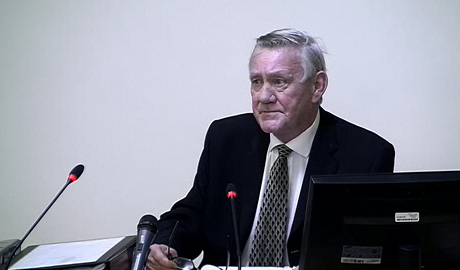 Alec Owens gives evidence to the Leveson inquiry
Alec Owens gives evidence to the Leveson inquiry David Sherborne, barrister for the victims, replies that the distinction between Hugh Grant's evidence being mistaken and "what he was accused of" is one that you will find in any dictionary "and I would advise that the Daily Mail and its editor consult one".
Caplan says that there was never any intention to intimidate a witness, but there was every intention to address criticism of his client.
Associated Newspapers says it is prepared "for the moment" to remove the phrase "mendacious smear" from the Daily Mail website before evidence to support (and contest) the statement can be called. Jonathan Caplan QC, counsel for Associated Newspapers, is back on his feet addressing complaints by David Sherborne, barrister for the victims, about the Daily Mail's description of Hugh Grant as delivering a "mendacious smear" about the newspaper last week.
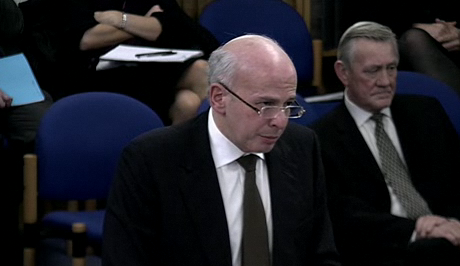 Jonathan Caplan QC, counsel for Associated Newspapers, addresses the Leveson inquiry
Jonathan Caplan QC, counsel for Associated Newspapers, addresses the Leveson inquiry We're back. Robert Jay QC, counsel to the inquiry, confirms that we will now hear from the victims' solicitor Mark Lewis this afternoon. He adds that Richard Thomas will appear next Friday, instead of tomorrow.
Before we get back to business after lunch, here's a short profile of Alec Owens, who will shortly give evidence to the inquiry:
Making waves this lunchtime is (as ever) Guido Fawkes, whose legal representation will not be paid for by the Leveson inquiry, and Paul McMullan, whose unique dose of tabloid candour has made its way to the US.
Why isn't @Leveson paying @Guido's legal fees? He sumoned him and I don't think guido's as wealthy as the celebs who are getting expenses.
The Paul McMullan testimony just hit US TV - the hosts were literally stunned into head-shaking silence. "Who is this creep?"
• He describes a "frankly putrid" press with some sections "barely worth defending"
• The PCC has failed because it is "of the press and for the press", Campbell claims
• He suggests an arbitration body to replace the PCC that could advise on public interest
Robert Jay QC says that there are further concerns about evidence Mark Lewis is due to give this afternoon and that he suspects it won't be possible to hear from him today.
Alec Owens, the lead investigator on the ICO's Operation Motorman report in 2003, is back at 2pm. We'll be back with a summary shortly.
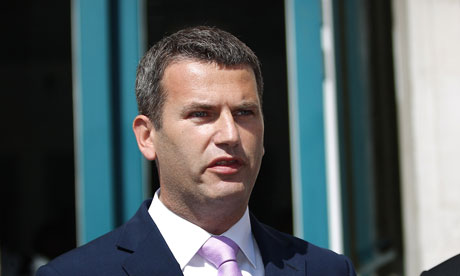 Mark Lewis may not be able to appear this afternoon because of concerns over his evidence Photograph: Peter Macdiarmid/Getty Images
Mark Lewis may not be able to appear this afternoon because of concerns over his evidence Photograph: Peter Macdiarmid/Getty Images After three hours, Alastair Campbell has finished his evidence.
Campbell says that the leaking of his statement on the Guido Fawkes blog was not that impactful because newspapers decided not to touch it.
If you get the newspaper regulation right, I think that will have an impact on the internet as it develops. There may come a point where you have to apply some standards that can apply to the internet as well. It surely won't be that long until there's a defamation case over something that is said on Twitter. Get that right and some of the other stuff ought to fall into place.
Briefly on the Hutton report, Campbell attacks Andrew Gilligan, saying thast rather than being "unemployable" he has "gone on from strength to strength" which he describes as "a symbol of press culture".
Lord Justice Leveson has time for one last question, it's on the internet and journalism.
Campbell says "you're right to worry about it" but that we're at a stage where TV and newspapers are still the most dominant forces in the debate. He says if there was a system of regulation that drives standards up in traditional media, then standards will rise online.
On contempt of court, Campbell says that a lot of journalists nowadays are not trained to be journalists and so are not well versed with the laws of contempt. He claims that this danger is amplified with the speed of news.
"The real tragedy for the press and good journalists is that the PCC code is a very good code," he says. "Had it been adhered to I don't think we would be where we are today".
He is now asking that media barons be participants in the countries in which they wield the most power, mentioning Rupert Murdoch ("opaque tax structures around the world"), Lord Rothermere and the Barclay brothers ("non-doms").
He says:
"Senior newspapers and editors now they are players, rather than spectators. It's a pretty unaccountable form of power, but it is a form of power."
Campbell is now being asked for his thoughts on new models of press regulation.
"This should not be seen as a one way drive against the press. I think existing case law works against the public and the press," he says, mentioning laws on confidentiality and defamation.
He suggests an arbitrary body – like the Nick Davies example – that journalists and members of the press could go to and take advice on public interest justifications. "I don't think that would be that hard to set up," he says.
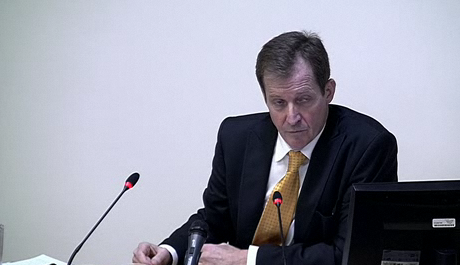 Alastair Campbell at the Leveson inquiry
Alastair Campbell at the Leveson inquiry Campbell says that the PCC were good at protecting the Blairs' children, but that numerous timed he discussed taking up complaints with the body but ultimately resigned to defeat.
Campbell says the PCC should be able to step in and say 'hold on a minute, here's the code and here's where you're breaking it' with developing news stories, like the search for Madeleine McCann.
"They put the press interest ahead of the public interest and I think they've done that throughout their existence," claims Campbell. "On the bigger issues, I think the PCC has utterly failed".
Campbell says:
They were trying to keep us happy as the government; they were trying to keep the media barons happy; and they were fixing between the two ... I think at the national level it was much more on these meta issues which I think they handled very very badly.He adds that any replacement body should be set up by parliament but there should be no political or media interests on it.
Campbell is now riffing on the Press Complaints Commission. "It's failed," he says. "It's failed because it is a body that's been of the press and for the press."
He says there should be "no live media figures" on whichever body replaces the PCC to avoid it becoming "a vested interest".
Back on the Daily Mail again, Campbell is talking about a story that the paper wrote about his father's death ... when he was still alive. Campbell says he phoned Paul Dacre who admitted "he didn't have a leg to stand on" and published a correction.
The Financial Times is reporting that the deal for Charlotte Church to sing at the wedding of Rupert Murdoch in exchange for £100,000 or favourable converage was brokered by Matthew Freud, Murdoch's son-in-law.
The FT reports:Jonathan Shalit, Ms Church's manager until 2000, told the Financial Times that the proposal had come in a "very relaxed" call from Mr Freud, but that no payment had been offered. The promise of favourable coverage was explicit, he said, "but done in a warm, friendly, positive way. There was nothing sinister about it.
"In return, it was understood the Murdoch publications would support Charlotte in the US," Mr Shalit said. "In the same way a plumber might do a favour for an accountant and the accountant might do a favour in return, I think it's totally acceptable business practice. That's life," he added.
I've got no evidence of the Daily Mail ever hacking telephones, Campbell says, but that he's not prepared to say that he thinks they never used criminal methods to get stories.
All I will say is that in relation to all of us who were in government at that time, all sorts of stuff got out ... You'd just sit there scratching your head thinking how did that get out? Given what we know now I have revised my opinion in several regards as to how stuff may have got out.
Campbell confirms that Carole Caplin, the former personal assistant to Cherie Blair, told him she was targeted by Glenn Mulcaire in 2001 to 2003. Caplin has told Campbell she would be happy to assist the Leveson inquiry.
This is not necessarily new. Caplin disclosed that she had been told of phone hacking earlier this month.
Campbell is back onto Paul Dacre and his denial that the Daily Mail and Mail on Sunday have ever acted unlawfully in the pursuit of stories.
He says: "If he can state that confidently to a House of Lords committee, he ought to be able to answer for every single transaction. And if he cannot do that he cannot substantiate that statement to a House of Lords committee."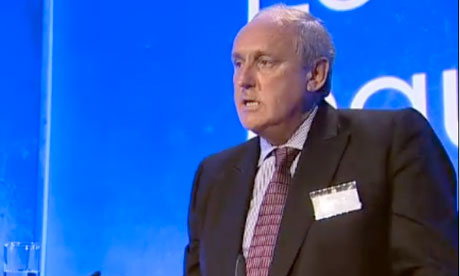 Paul Dacre at the Leveson Inquiry
Paul Dacre at the Leveson Inquiry On the use of private detectives by newspapers, Campbell says he doesn't recall any from his time as a journalist in the eighties.
He adds:
We don't know as we read a newspaper any morning of the week the extent to which they've come from private investigators ... or if those private investigators have broken the law ... or if the newspapers know that they have broken the law.Campbell claims that editors would "certainly" know if more and more money was being spent on private investigators.
Alastair Campbell alleges that most of the investigations by Mazher Mahmood, the undercover former News of the World reporter who now works for the Sunday Times, were not in the public interest and so in breach of the PCC code.
I would echo something that Nick Davies said yesterday. On all of these there are difficult judgments. But if you go on ... Kate Middleton's uncle ... Michael Phelps ... Joe Calzaghe ... Wayne Rooney ... I don't think we should buy this line that the NoW put out at the time of its closure that they were some great campaigning organ that was changing the world for the better
Campbell describes coverage of the media in the media as "exceptional" and that the conduct of newspapers should have come under the microscope sooner.
He says he has been told that the Mirror paid private investigators to look at him, a member of his family and Peter Mandelson.
The level of misrepresentation of government policy in the Daily Mail, Campbell says, was such that he suggested to Tony Blair to run "MailWatch" to find and rebut stories in that newspapers.
By and large, the response to Blair's attack just pressed the F12 key. Yah booh. You're a politician. We're media yahoos. Get over it. Of course, the attack all seemed a bit rich, coming from a government which took the media more seriously – and tried to control it more effectively – than any previous administration. I remember once being in Number Eleven Downing Street waiting to do an interview with Gordon Brown, and a side door from Number 12 opening. In previous governments, Number Twelve was where the Chief Whip had his office. Now, as it swung back I was astonished to see the place had been taken over by what seemed to be a fibre-optic version of a Victorian counting house - a squad of young people sitting at rows of desks, on the phone bending the ears of journalists. At the top – can he really have been sitting at a higher desk? - that's certainly how I think I remember it – sat the brooding figure of Alastair Campbell. The scene showed how thoroughly priorities had changed: where once government used the room to control and discipline its MP's in parliament it now used it to try something similar with the media.
And with that, Lord Justice Leveson calls for a five minute break. Stay with us.
Campbell says that the content of the speech was never debated by the media, it was simply passed by, and reads out a quote from Jeremy Paxman who said there was something in the charges that the then-prime minister had put to the press.
He adds that part of the judgment from Blair would have been broadly "the press don't give us much of a hard time as they give other Labour governments, which would have been seen as a plus". Campbell thought the the issue had "gone beyond" any political advantage that they might have gained, and urges current parties to tackle the press.
"I think this should be a big issue at the next election," he concludes.
Campbell is talking about Tony Blair's big "feral beasts" speech on the media. He says the duo agreed on most things but disagreed on the press, and Blair felt the press was causing "damage to the culture of the country".
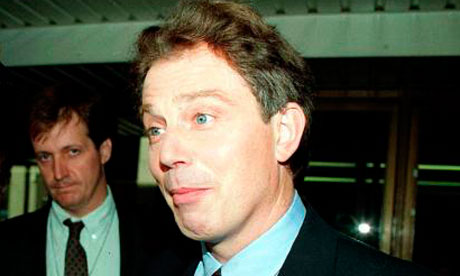 Alastair Campbell and Tony Blair in 1998. Photograph: Neil Munns/EMPICS Sports Photo Agency
Alastair Campbell and Tony Blair in 1998. Photograph: Neil Munns/EMPICS Sports Photo Agency Campbell says he differentiates between "the Murdoch papers" and the Mail because the Mail has a "culture of relentless negativity".
Campbell thinks this is why newspapers in general have seen falling sales, because they've misunderstood what people want. "People want something better than what they've been given".
He goes on to say that newspapers can be "bad for public health", mentioning the controversy over the MMR jab:
"If there is anybody out there who's child has measles, yes they can blame Mr Wakefield, but they can blame the press too"
Rhodri Davies QC, counsel for News International, has just interjected after Campbell brought up a Sunday Times article that he claimed made up a quote from John Prescott. Davies claims it was misattributed.
Campbell stands his ground and the inquiry moves on. Jonathan Caplan QC, the counsel for Associated Newspapers, has interjected. He says the Mail is adamant that the quotes were not made up, they were properly received and prepared from prosecutors in the Amanda Knox trial before the verdict.
Campbell is now talking about a Polly Toynbee report in the Guardian on Ed Miliband's recent Labour party conference speech.
Campbell's evidence has turned into a whistlestop tour of journalese. He is now deploring the use of anonymous quotes, singling out for criticism the false MailOnline story on the Amanda Knox verdict that apparenetly had invented colour from the courtroom.
Campbell says the Washington Post's Watergate was "a great story but a disaster for journalism".
Campbell says people in the press blame him for a denegration of political coverage. "They're in denial," he claims.
"I know they say that and I reject it. I think it's a very very self-serving argument," he says about journalists.
Campbell witness statement p 53-4 describes what happened when he spoke up in support of original phone hacking story in July 2009And:
[Campbell] says: "I received a series of ...mildly threatening text and phone messages from senior journalists and executives at News International"And:
Campbell does not name which executives he received the "mildly threatening" messages from.
Campbell is now on to accuracy in newspapers. He says "impact of the story is now deemed to be more important than the accuracy".
He suggests that many of the newspaper articles previewing George Osborne's autumn statement will have been made up.
Most of our newspapers every single day are in breach of the Press Complaints Commission code of practice on accuracy, Campbell claims, mentioning the Sun and the Daily Mirror.
Campbell claims that papers blur the line between fact and conjecture so much that it is surely in breach of the PCC's code: "When they are taking a fact and using that to promote that agenda, and it turns out the fact is inaccurate ..."
Campbell says that editors genuinely may not know that the law is being broken left, right and centre.
"Do they know? Do they ask where they came from? Do they always know?" Campbell says, adding that Paul Dacre cannot really be so sure to state that the Daily Mail has never published a story obtained by illicit methods on his watch. "Can he say that? Can he really know that? I don't think he can."
"Do they know? Do they ask where they came from? Do they always know?" Campbell says, adding that Paul Dacre cannot really be so sure to state that the Daily Mail has never published a story obtained by illicit methods on his watch. "Can he say that? Can he really know that? I don't think he can."
We allow the public to hate or like these celebrities who want to be in magazines, Campbell says, but journalists think it forms a huge public service.
"There's no transparency about the journalistic practices that they use to fill their papers," he says.
"The public out there are horrified by what they've heard in the last two weeks ... my argument this is not atypical. This is what happens to anybody who they decide is a major news commodity".
Campbell says his own witness testimony "completely undestates the inhumanity" of the coverage of Milly Dowler and her parents.
Reporting rumours has been accelerated by political bloggers online, Campbell says.
Campbell says regulating journalism and the internet is a very difficult thing to do – mentioning that the French government is looking at it – but that it's worth thinking about.
Back to Campbell. He is talking about the impact on newspapers of the advent of 24-hour-news, reality TV, celebrity magazines and increased commercial pressures.
There's not many journalists doing journalism "as a craft," he says, and that's had an effect on their "increasing reliance" on private detectives.
We've got more on Bethany Usher, the 31-year-old former News of the World reporter believed to have been arrested this morning in Northumbria.
Her online biography reads:
"Bethany spent seven years working in the newspaper industry after reading English Literature and Language at the University of Leeds. She quickly progressed from a trainee reporter on the Sunderland Echo to Crime Reporter, after gaining top marks in her NCE senior journalist exams. Bethany then moved to Fleet Street and worked for two of Britain's leading Sunday newspapers. She worked her way up to Northern Editor and gained experience in multimedia journalism. Bethany has won four awards and was named Young Journalist of the Year in 2003."
The freedom of the press that is being defended most loudly, Campbell says, has become a press "barely worth defending".
He says at the moment the press is "frankly putrid in many of its elements"."A very very small number of people have changed the newspaper industry so they've now frankly besmirched the name of every journalist in the country."
Lord Justice Leveson describes Campbell's evidence as "a formidable piece of work" and thanks him for putting it together.
Alastair Campbell is on the witness stand. He is being questioned by Robert Jay QC.
He admits sending the draft to people in advance, including people in the media, but is confident that none of the people he sent it to would have leaked it to the Guido Fawkes blog.
Reports are filtering in that the 31-year-old woman arrested this morning is Bethany Usher, who worked at the News of the World in 2006 to 2007 in Manchester, according to Sky News reporter Martin Brunt.
We're underway. The counsel for News International, Rhodri Davies QC, is asking Lord Justice Leveson to be able to ask Richard Thomas, the former information commissioner, questions in person tomorrow.
Lord Justice Leveson is non-committal, saying in principle he's minded to allow it, but will return to it later today.
Before we get underway, here's a short profile of Alastair Campbell, who is expected to be first on the stand:
Tony Blair's former director of communications has criticised newspapers for spinning stories more effectively than any publicist could.
Tony Blair's former director of communications has criticised newspapers for spinning stories more effectively than any publicist could.
A former journalist at the Daily Mirror, Sunday Mirror and Today, Campbell was on first name terms with nearly every Fleet Street editor during his time at No 10. He wrote on his blog last week that he was "giving his evidence considerable thought".
Much of that thinking is likely to be about Daily Mail editor Paul Dacre, of whom Campbell has been critical of late.
He wrote on his blog in July, after David Cameron had announced the Leveson Inquiry into press standards, that Dacre "will be a central figure in any public inquiry into the standards and practices of the modern press, because the Mail's influence has been so strong upon the rest of the media".
Of the press generally, Campbell wrote: "One of the reasons they are in the mess they are in is that they believe the standards by which they judge others should not apply to themselves."
Today Lisa O'Carroll and Stephen Bates are at the Royal Courts of Justice.
You can follow Lisa on Twitter at @lisaocarroll, where she has just tweeted (almost symbolically): "Fleet street closed because of strike. Nice start".
Dan Sabbagh (@dansabbagh) will be tweeting from the office, and Josh Halliday (@JoshHalliday) is on the live blog.
First question Alastair Campbell should be asked by Leveson: "Did you leak your witness statement to journalists?"
And:
Second question Alastair Campbell should be asked by Leveson "To how many journalists did you email your statement?"
There appears to have been another significant development in Operation Tuleta, the police investigation into computer hacking by private investigators working for newspapers.
The Irish Independent reports that Hugh Orde was targeted by computer hackers while he was chief constable of the Police Service of Northern Ireland.
The allegation comes just 24 hours after the former Northern Ireland secretary Peter Hain was also warned that his computer may have been hacked.
A late addition to today's line up is Mark Lewis, solicitor for several alleged victims of phone hacking, who will give the second part of his evidence after first appearing last Wednesday.
Police investigating phone hacking at News International have arrested a 31-year-old woman in connection with conspiring to intercept internet communications.
Welcome to day 10 of the Leveson inquiry. Today we'll hear from Tony Blair's former chief spin doctor, Alastair Campbell, and Alec Owens, the lead investigator at the information commissioner's office when it conducted Operation Motorman in 2003.
Campbell's testimony was at the heart of a minor constitutional crisis earlier this week after a draft version found its way onto Guido Fawkes' blog and Lord Justice Leveson ordered an immediate takedown.
Paul Staines, the blogger behind the site, will explain himself tomorrow afternoon.
Also up today is Alec Owens, a retired policeman with 30 years experience, who led the information commissioner's 2003 investigation into the use of illegally-obtained information by newspapers.
Please note comments have been switched off for legal reasons.
http://www.guardian.co.uk/media/blog/2011/nov/30/leveson-inquiry-alastair-campbell-live?CMP=twt_gu
